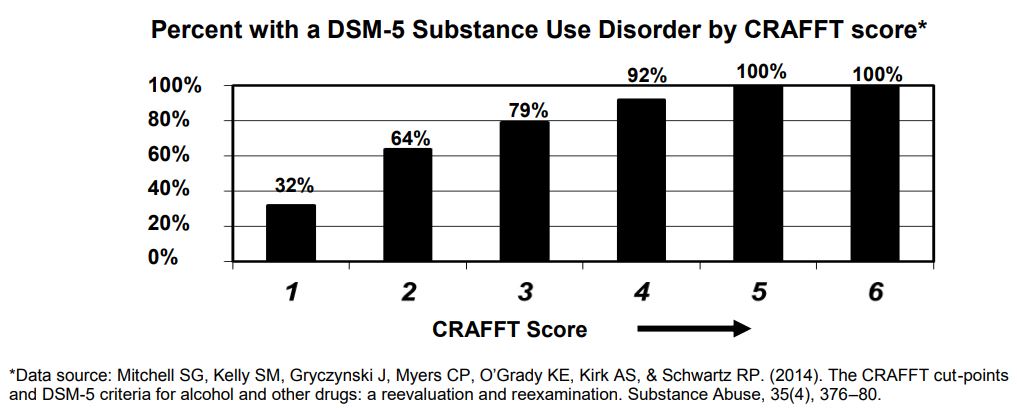At-Home Evaluation
Do you have a substance use disorder (SUD) or opioid use disorder (OUD)?
There are two questionnaires you can use to self-evaluate if you have an SUD/OUD. They are call the CRAFFT Questions and the CAGE Questions. These are similar questions that providers use with their patients. However, if you suspect you have an SUD/OUD please talk to your own provider who can diagnose you and get you appropriate treatment.
Please note: The results of these questionnaires is not an official diagnosis. If you believe you have a substance or opioid use disorder, please talk to a provider.

CRAFFT QUESTIONS
The CRAFFT questions can answered at home by a young person or their family to help evaluate risk or to decide if medical help is needed.
PART 1
During the past year, did you:
1. Drink any alcohol (more than a few sips)?
2. Smoke any marijuana or hashish?
3. Use anything else to get high? (includes illegal drugs, over-the-counter or prescription medicines, or anything that you sniff or “huff.”)
If the answer is “yes” to any of the first 3 questions, part 2 questions are answered.
If the answer is “no” to all of the first 3 questions, only the next “car” question will apply.
PART 2
Answer “yes” or “no” to the following questions:
C Have you ever ridden in a CAR driven by someone (including yourself) who was “high,” or had been using alcohol or other drugs?
R Do you ever use alcohol or other drugs to RELAX, feel better about yourself, or fit in?
A Do you ever use alcohol or other drugs while you are ALONE?
F Do you ever FORGET things you did while using alcohol or drugs?
F Do your FAMILY or FRIENDS ever tell you that you should cut down on drinking or drug use?
T Have you ever gotten into TROUBLE while you were using alcohol or drugs?
What does my CRAFFT score mean?
2 or more “yes” answers to the CRAFFT questions suggest that an individual is at high risk for substance use problems and/ or dangerous behavior. It is advised that they should seek medical help as soon as possible. These questions alone cannot diagnose a substance use disorder but can help patient and provider decide if treatment should be considered.

CAGE QUESTIONS
The CAGE questions are often used to screen for alcohol abuse in adults. However, they can also help identify other substance abuse problems.
These questions include:
C Have you ever felt you needed to CUT DOWN on substance use?
A Have people ANNOYED you by criticizing your substance use?
G Have you ever felt GUILTY about substance use?
E Have you ever felt that you needed a drug first thing in the morning ( EYE-OPENER)?
What does my CAGE score mean?
A total score of 2 or greater is considered significant enough to follow-up with a provider. A “yes” answer to question “E” (the last one) is a sign to talk to your provider about your substance dependence. Here is a list of places that you can go in Tillamook County to get help.
Other “red flags” that primary care providers look for to detect substance abuse problems in adults include:
Sources:
Providers Clinical Support System. (2017, December 6). What happens when an opioid-dependent person seeks treatment for the first time? – PCSS
.
https://pcssnow.org/resource/happens-opioid-dependent-person-seeks-treatment-first-time/
Mersy, D. J. (2003). Recognition of Alcohol and Substance Abuse. Am Fam Physician. Apr 1;67 (7), 1529-1532.
Proactive methods to prevent opioid addiction
Sources:
Partnership to End Addiction. (2020, August 5). Your Comprehensive Guide to the Opioid Epidemic — and What You Can Do About It. https://drugfree.org/article/your-comprehensive-guide-to-the-opioid-epidemic-and-what-you-can-do-about-it/?utm_source=email&utm_medium=parent&utm_campaign=opioid-ebook-release

